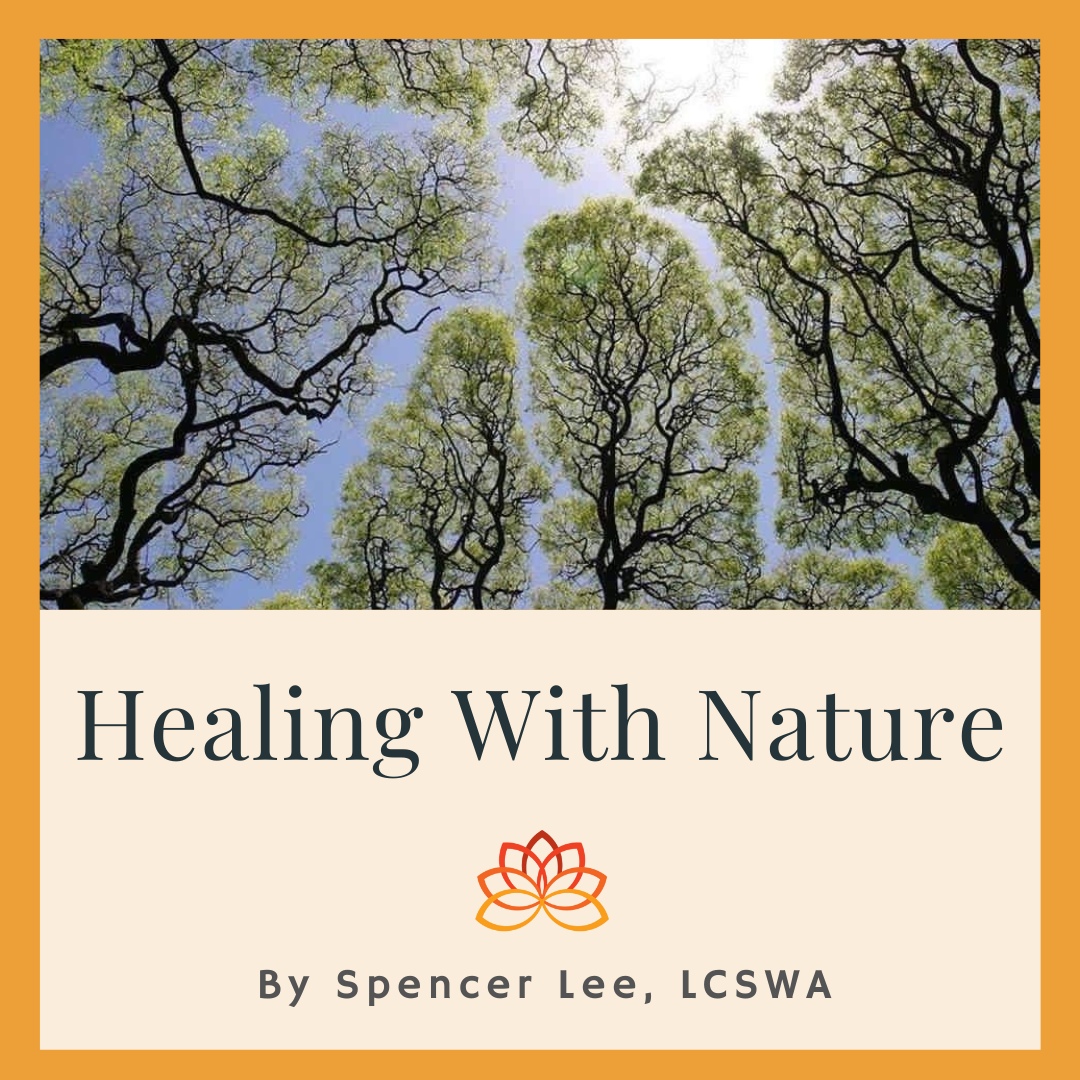Healing With Nature
by Spencer Lee, LCSWA

I feel as if all around me are advertisements for things that say “all natural”, “natural spring water”, “organic produce”, etc. The marketing departments must be on to something, and yet, how many of us really connect with nature itself? How often do we go outside and engage with the world we live in?
Researchers have found that spending time in nature positively impacts our emotional health, cognitive function, and physical wellbeing. Spending time in nature has been shown to lower blood pressure and stress hormones, improve sleep, mood and immune response. Additional studies have shown that spending time outdoors can improve our memory and attention span. But how on earth does nature do all that??
Dr. Leif Hass, in the Greater Good Magazine, explains three theories as to how nature literally helps us heal.
1. Nature provides a “soft fascination” for us. Many sources of entertainment, although enjoyable, take considerable effort, energy, or attention from us. Nature on the other hand has a unique ability to capture our attention without draining us. Nature leaves us feeling both enriched and relaxed at the same time.
2. The biophilia theory asserts that since humans began their story in nature, we thrive when we are exposed to or surrounded by the outdoors rather than how we spend much of our lives today (as I write this from inside my home, on my couch, with not a speck of nature in sight).
3. Nature produces a sense of awe. Have you ever seen a new animal for the first time? Or witnessed a full moon rising above the horizon? Awe-inspiring events in nature decrease stress and even symptoms of depression by placing our focus on a force greater than our own circumstances.
The physiological changes in our body while in nature such as decreased stress hormones and blood pressure put our bodies into recovery and rest mode. While in this state, our body takes time to actively heal, similar to when we sleep. This is the connection between nature, health, and even happiness.
Now, the problem many face is that getting outside regularly can be a heavy feat to accomplish. In many ways, the world we live in today involves going to work, going home, and going to some other place of business. There are not many opportunities to get outside unless we take the time to visit a park or are fortunate enough to live in a less urbanized location. So, with limited access to nature and limited time on our hands, how are we supposed to connect with nature?
Well, I have good news. A study explained by the American Psychological Association looked at over 200,000 participants and found that those who spent two hours outside over the course of the week said that they felt noticeable improvements in health and well-being. The research found that those two hours can occur all at once or spread throughout the week- that math comes down to less than 20 minutes a day!
Now that we’ve got the time issue figured out a bit, I’d like to introduce a really fun idea that is all about creating adventure in the outdoors when there seems to be “nothing to do”. The term is called psychogeography. Psychogeography as a noun, “describes the effect of a geographical location on the emotions and behavior of individuals”. This makes sense, how do you feel in your backyard versus on the beach? Or when you witness a sunset in the mountains? Or (my personal favorite) when you walk outside at night and can still feel the summer heat beneath your feet?
The concept of psychogeography was realized through the act of wandering, and noticing our experiences along the way. Karen O’Rourke, in The Mit Press, writes that the founders of psychogeography had it in mind to be a sort of game that everyone can play- a way to add fun into our lives.
Here are some examples of the game of psychogeography:
- Step outside and turn right every time you see a squirrel.
- Walk a path you never have before.
- Walk a path that you normally do but see if you notice something you never have before. This one can be especially fun. It’s just like when you watch a movie more than once and each time you notice new things that you never picked up on before.
You can read all about psychogeography, its origins, and different ways of practice here.
Try This!
One of my all time favorite ways to explore outside is geocaching. Geocaching is sort of a grown up treasure hunt. Regular people around the world take a container that can range from the size of your pinky nail to a storage container and disguise it out in nature. This person then creates clues and general locations for any geocacher to find. Once the “cache” is found, the finder signs their name on a log inside the cache. Larger caches often include little trinkets you can after leaving one of your own in exchange.
Check out https://www.geocaching.com/play for more information and to get started!
You can also learn more about the different associations between our lives and nature here.
Check out this Nature and Nurture Eco Retreat by Jessica King, LCSW and Michelle Walker, LCSWA this fall!
